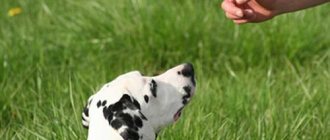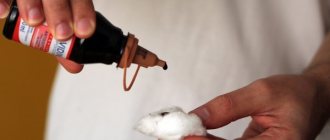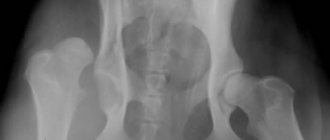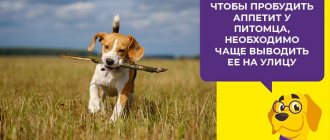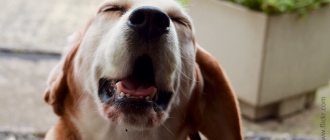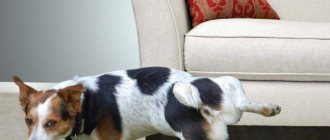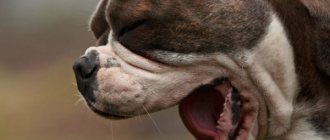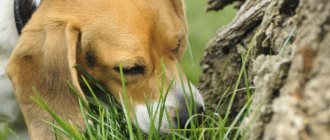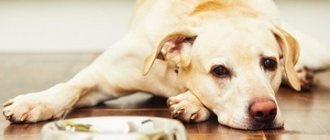General information
People who are not very familiar with dogs and their behavior will not find it strange that a dog often licks and smacks its lips. Sometimes this is due to animal reflexes, and sometimes it can be a sign of stress or illness.
Intense salivation, provoked by behavioral or reflexive reasons, causes the dog to lick itself frequently. Some health problems also result in overactive mucous membranes.
The cause for concern is the constant nature of this habit, which distinguishes the manifestation of the simplest reflexes (hunger, thirst) from a possible health problem.
Why does a dog yawn if he's not bored?
Category: Education
Observe your pet carefully and you will see that the dog yawns under certain circumstances. And not always out of boredom. For example, when she is hugged too enthusiastically, especially by strangers. What does yawning mean and how a person can use it to cope with stress, read the article.
It is believed that by yawning people express boredom or they lack oxygen in the blood. Scientists offer several options for the occurrence of this strange phenomenon. No one has any reliable evidence yet:
- the need to cool the brain temperature,
- the body's desire to cheer up,
- brain reboot
- low oxygen content in the blood.
One thing has been proven - yawning has a positive effect on the body, no matter what the reason for it.
It’s clear with people, but why does a dog yawn?
Yawning is characteristic of most vertebrate representatives of the animal world. And relatives of wolves are no exception. Dogs are social animals that obey the rules of society, canine and human. And even a little cat, if a purr lives nearby. This means that the rule of contagious yawning also works for them.
Try yawning sweetly a couple of times near your pet and carefully watch his reaction. Empathy and compassion towards the owner should work and the animal will also yawn.
Norwegian dog expert Thurid Rugos is known to the world for her knowledge of communication between dogs and humans. She promotes a non-violent method of communicating with animals. Her book, Dialogue with Dogs: Signals of Reconciliation, mentions a signal called yawning. This is one of the signals that expresses a dog's anxiety and nervousness.
According to Thurid Rugos, yawning is one of the types of communication. And the pet, in this way, wants to show that he is uncomfortable, that something is straining or constraining him. This could be a quarrel in the family, the animal being forced to be close to an object that it does not like, hugging too tightly, a stressful situation like being in a veterinary clinic.
Yawning Helps Relieve Dog Stress
Thurid Rugos, after lengthy observations and some experiments, found out that a dog yawns for another reason - it wants to calm not only itself, but also another dog that is under stress. In this manner, it sends a signal to reduce stress.
We recently wrote about dogs who are afraid of fireworks. It turned out that in the event of loud sounds that frighten the animal, the owner and household members should calmly continue their activities and yawn. The pet always watches people’s actions, their intonation in conversations and facial expressions. Yawning on the part of bipeds and their leisurely actions signal that everything is in order and under control. Which means you don't have to worry.
By the way, when a hippopotamus yawns, it performs a different action - it releases gases from the body.
Post Views: 58
Liked this:
Like
Reasons for the appearance of the reflex
As is known, primary reflexes manifest themselves at an unconscious level. But without reasons, which, in turn, can provoke a reaction, there are no reflexes.
Hunger and thirst
Like a person, a dog is positively receptive to various tasty odors, only the animal’s sense of smell is many times stronger and more subtle. When an animal feels hungry, the mucous membranes begin to work more intensely, saliva is produced, and the nose becomes more moist. As a reflex, the dog will often swallow saliva and lick its nose to renew the moist coating, which helps enhance the sense of smell.
It is important to note that in a pet such a reaction occurs only when a stimulus appears and when it is hungry. The constant manifestation of this reaction should not be attributed to hunger. Drying of the nose due to decreased activity of the mucous glands is another reason why a dog licks its nose. This reaction may also indicate thirst. Licking and smacking, especially in hot weather, indicates the pet's need for moisture.
Thirst can be quite dangerous, so it is very important to ensure that the animal has access to water at all times. Refusal or limited fluid intake may indicate a serious illness.
For dogs suffering from chronic diseases, it is recommended to give only filtered water.
Stress and anxiety
An animal experiencing strong emotions (fear, excitement, impatience), or under stress, may lick not only its nose, but the entire face. Emotional arousal forces the body to work more actively, which is why the pet begins to swallow more often. Sometimes, from particularly strong excitement, the dog begins to smack its lips.
Stress
If your dog is constantly licking his lips, it may indicate stress. Over time, this habit can turn into a reflex. The following reasons can cause anxiety in an animal: moving, changing owner, going to the veterinarian. It is worth noting that small insignificant changes can also negatively affect the animal: changing the usual food to a new, new house with an unpleasant odor for the animal.
An important component for a dog's emotional health is the correct attitude of the owner towards him. Dogs are animals for which hierarchy in the pack is important. It’s just important not to overdo it when building a relationship with your pet. You shouldn’t scold your dog for no reason, hit it, or get upset over your bad mood. Don't forget to reward your pet.
Causes of the symptom
If all of the above can be excluded, then this behavior may be a sign of a disease or mechanical damage.
Food allergies
The manifestation of allergies after a change in diet happens so often that it can be called a kind of anti-norm. A decrease in food quality or an unusual (for example, dietary) diet can be quite painful for your pet. Experienced breeders and dog breeders warn that a change in diet should be introduced gradually, over a certain period of time.
If there is no time for a gradual change in diet, you need to ensure that the dog consumes a large amount of fluid and reduces stress. The presence of itching, dermatitis, swelling of the mucous membranes and tearing will help make a correct diagnosis. Often, due to itching, the pet licks its limbs so much that wounds and ulcers form.
Oral diseases
All sorts of problems with teeth, gums, and oral cavity affect the taste of saliva and the smell of your mouth. By licking, the animal tries to calm down and improve its sense of smell. Halitosis can also be caused by a bacterial infection.
Impaired kidney and liver function
Excessive salivation can be a sign of very serious problems with the dog’s kidneys, genitourinary system, and liver. During the period of licking the muzzle, other symptoms do not yet appear, so at the same time you need to pay attention to the frequency of urination, the ratio of the amount of fluid consumed to the amount of urine, and the color of the mucous membranes.
Poisoning
Excessive salivation in parallel with vomiting, diarrhea, decreased body temperature and convulsions, pallor or bluish skin indicates poisoning. It is a mistake to believe that a dog can be poisoned or that it can only pick up something on the street. Potential sources can be found in any home: household chemicals, spoiled food, medications, pest control, even chocolate, which is a terrible poison for dogs.
Foreign object
Smacking, constant licking, depressed mood, nausea and lack of appetite may indicate that there is a foreign object in the dog's digestive system. Your pet may swallow something while playing with a stick outside, or it could be any other small object accidentally dropped in the house. If it doesn't come out naturally, it can get stuck in your teeth or block your intestines. In such cases, it is best to seek advice from a veterinarian.
Epilepsy
Epilepsy attacks may be accompanied by frequent lip licking and heavy breathing. In this case, attacks can have different strengths depending on the severity of the disease. Mild seizures may be accompanied by twitching of the muzzle and nervous tics; in the worst case, the animal may convulse and lose consciousness.
Other symptoms of epilepsy:
In the event of an attack, there is no need to panic. You should monitor the time - the seizure should not last more than 5 minutes, otherwise the pet may need the help of a doctor. It is necessary to ensure that the animal is not injured. Don't try to put a spoon in your dog's mouth to prevent it from swallowing its tongue. This will not happen, and the owner’s intervention can only cause harm. After the seizure ends, the animal must be shown to a doctor to diagnose the cause of the seizure.
Thus, if your dog is constantly licking itself, you should carefully monitor the animal. This may be a completely natural reaction to the type of food or lack of water. You should carefully examine your pet's mouth for possible injuries. If the cause of increased salivation is still unclear, you should take your animal to the veterinarian.
Source
How to fix the problem
If you don't know why your dog is constantly licking, consider all possible causes and rule out unlikely ones. If you become ill, consult a specialist immediately. If possible, carefully examine your pet at home in order to take rescue measures (for example, in case of poisoning) immediately. If health problems, mechanical damage and stress can be ruled out, then try to solve behavioral problems by redirecting attention.
Dogs begin to lick themselves, people, and objects, usually out of boredom. This can be dealt with in two ways (preferably in combination): if possible, engage in your pet’s leisure time more actively and render the object of enthusiastic licking unusable. To do this, you can use special repellent sprays with citrus scents or pepper tincture. They should be used extremely carefully so as not to harm the pet.
You can seek help from a professional dog handler who will help discipline the animal. If the problem is psychological in nature, a very subtle professional approach is needed. Therefore, do not self-medicate, but immediately contact a specialist and strictly follow his recommendations.
Recommended Posts
What kind of nose should a healthy dog have and why is it wet?
Why does a dog whine and tremble, as if with a chill?
Why does your dog constantly shake his ears and what to do about it?
Why does my cat constantly meow for no reason?
Why doesn't a dog drink or 3 reasons for refusing water?
Why is my dog constantly licking himself?
At one point, your pet may begin to lick itself very often, as if something is bothering it. Sometimes the dog's salivation increases, but upon examination his nose, mouth and teeth are clean. Why does the pet behave this way?
Dogs may lick their lips incessantly as a calming gesture when they feel threatened or anxious, or when experiencing nausea, oral discomfort, allergies and pain.
Often licking, accompanied by drooling, is associated precisely with nausea. Poisoning, indigestion and other gastrointestinal problems usually lead to this condition in the animal. Certain medications, such as anesthetics, can also cause nausea and vomiting. Some dogs eat grass when they feel sick, which causes them to vomit. If this condition of the animal continues for more than 24 hours, contact your veterinarian.
2. Discomfort in the mouth
This is especially true in hot weather and during active games. When a dog becomes dehydrated, the following signs may appear: dull and sticky gums, sunken eyes, and loss of skin elasticity. At the same time, the pet licks and smacks its lips all the time. It is not difficult to detect the problem: just take a fold of the animal’s skin, pull it well and release it. If it slowly returns to its original state or forms a “tent,” your dog is dehydrated. Give her something to drink immediately and take her to a cool place (if you suspect sunstroke or heatstroke). Dehydration can also occur with persistent vomiting and diarrhea. In the latter case, take your pet to the veterinarian.
4. Epileptic seizure
During partial focal seizures, dogs may also lick their lips and snap their teeth as if catching imaginary flies. If after such “games” the pet looks lethargic, seek help from a doctor so as not to worsen the dog’s condition.
6. Calming gesture
Dogs, when faced with a threat or in anticipation of scolding from the owner or in front of aggressive brothers, may begin to lick their lips to calm down. This is how they send a message about their own anxiety and fear. It is important to pay attention to the situation in which the pet begins to behave this way.
7. Attracting attention
If the problem is not nausea, pain and dehydration, then perhaps your pet is simply trying to get your attention in this simple way. Probably every time he comes up to you and licks you, he receives a portion of affection. Owners themselves sometimes do not notice how their pets associate their reactions to their behavior.
Why does a dog lick and yawn?
Licking and yawning in dogs are signs of nausea or extreme stress. Anxious or nervous dogs will constantly lick their lips and yawn. This appeasing behavior is similar to the nail-biting habit of nervous people. For example, you may have noticed that your pet constantly yawns during a visit to the veterinarian.
Why does a dog lick and sneeze?
Why does a dog lick and swallow?
Where are dogs' belly buttons?
How to make friends between a cat and a dog? Why does a hedgehog laugh? The entire encyclopedia about animals is on our website.
Source
